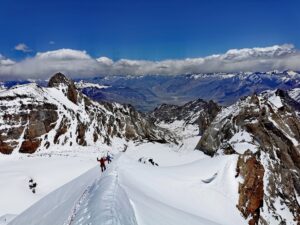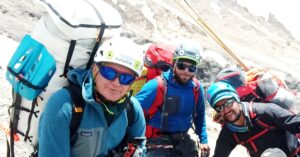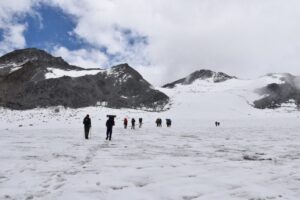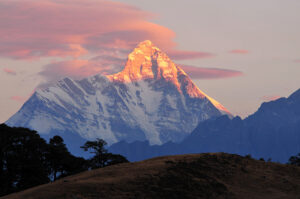In mid-March, 12 women left on a five-month, 4,500km journey across the Himalaya. Mountaineer Bachendri Pal, 68, led the east-west expedition that began in Arunachal Pradesh, India. Today, they finished their trek, as planned, in Ladakh.
All the women were over the age of 50. Pal handpicked her companions. All had previous mountaineering experience. Pal, the first Indian woman to summit Mount Everest, was the oldest member of the group.

Bachendri Pal led the expedition. Photo: wthe.2022
Along the way, the women traversed 35 mountain passes. The trek began with a 650km section through the Indian states of Assam, West Bengal, and Sikkim. In Assam, they covered 25km a day and treated this as an acclimatization phase. As their bodies got used to the effort, they tried gradually to increase their daily distance.

The Parang La Pass. Photo: wthe.2022
Into Nepal
Crossing into Nepal, they then trekked 1,500km before moving back into India. Here, they passed through Kumaon, Gharwal, Himachal, Spiti, and Leh. These sections involved the highest passes of the expedition and some of the highest in the world. These included the Thorang La Pass, Parang La Pass, and Lamkhaga Pass, all of which lie at about 5,280m.
At one of the high passes, one woman pulled out because of an undisclosed injury. But in general, other than aching feet, sore backs, and a few blisters, the women emerged from the Himalaya relatively unscathed.
To help with recovery, the team stayed in lodges wherever possible rather than camping. The Indian Army also supported them throughout the journey. This included accompanying the group through politically troubled areas for safety. Occasionally, the dozen women stayed overnight at army bases. Now and then, they camped.

Photo: wthe.2022
The weather and terrain varied constantly. In May, they dealt with the monsoon. The heavy rains created slippery trails, but they managed to maintain a 20 to 25km per day pace.
The weather also added an extra challenge to the highest pass of the journey, the Parang La. The pass connects the high desert of Spiti to that of Ladakh. Heavy snowfall changed the appearance of their route, and the group had to walk through high winds and an occasional whiteout. Though mules and donkeys normally carried some of their gear, the animals could only reach the edge of the pass. After that, the women carried their gear for the remainder of the trek.
The group covered the 4,500km in 140 days. They ended their journey at the Kargil War Memorial in Dras, Ladakh.

The group completed the trek in 140 days. Photo: wthe.2022






